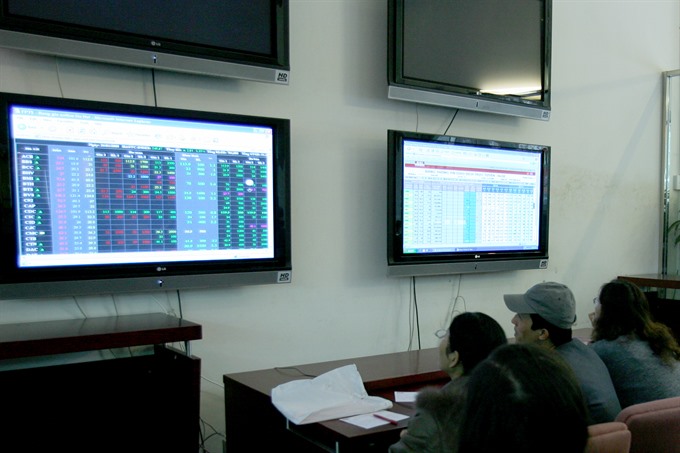 Economy
Economy

Việt Nam’s stock market is forecast to struggle due to uncertain market sentiment this week, as external factors increase volatility in the market.
 |
| Investors follow transactions at Sài Gòn Securities Inc (SSI) in Hà Nội.. — VNS Photo Việt Thanh |
HÀ NỘI — Việt Nam’s stock market is forecast to struggle due to uncertain market sentiment this week, as external factors increase volatility in the market.
The VN Index on the HCM Stock Exchange ended down 1.35 per cent on Friday to finish last week at 1,157.14 points. The benchmark index saw a week-total fall of 2.51 per cent, or 50 points, after five up-and-down sessions.
Last week saw the hardest fall of the VN-Index since January as blue chips suffered investors’ profit-taking pressure.
The minor HNX Index on the Hà Nội Stock Exchange lost 1.69 per cent to close last week at 133.34 points, posting a 3.39 per cent decline for the trading week.
The UPCOM Index on the Unlisted Public Company Market (UPCoM) lost 0.59 to close last Friday at 59.32 points, totaling a five-day decline of 2.17 per cent.
An average of 296.3 million shares was traded in each of the past five sessions, worth VNĐ8.7 trillion (US$381 million). The trading figures were down 2.6 per cent in volume and 21 per cent in value as compared to the previous week.
Phan Dũng Khánh, investment advisory director with Maybank Kim Eng Securities Co., told tinnhanhchungkhoan.vn that the over the last few days, the Vietnamese securities market was affected by external factors, including fears of a trade war between the US and China, political tension between the US and Russia, unexpected volatility in the global financial market and foreign investors acting as net sellers during four of the five sessions last week.
However, there was also some supportive information in the market such as GDP growth of 7.38 per cent in the first quarter, the best first-quarter performance in a decade, he said.
Listed companies’ Q1 earnings announcements, dividend payment plans and 2018 business plans will be announced and also become short-term supporting information for investors, greatly influencing the market performance.
President Donald Trump has directed his top trade and economic advisers to take a fresh look at the TPP trade agreement from which he withdrew in his first week in office.
According to Bảo Việt Securities (BVSC), the move could mark the beginning of a stunning shift for Trump, who railed against the Trans-Pacific Partnership during the campaign.
“The influence of the TPP on Việt Nam considerably diminished after the US withdrawal. The return of the US would have a significant impact on the country’s economic growth, especially in sectors where the US is a major export market such as the textiles and leather-footwear industries,” BVSC said in its report.
According to Nguyễn Hồng Khanh, head of market analysis at Sacombank Securities Company (SBS), the banking and securities stocks have been the strongest gainers since the beginning of the year and many stocks have reached the yearly target prices projected in the corporate earnings forecasts.
Many bank shares have risen more than 30 to 50 per cent over the beginning of the year, Khanh said, adding that organisations and individuals are in the process of taking profits.
Among banking stocks, Vietcombank, the Bank for Investment and Development of Việt Nam and Vietinbank have gained respectively 25 per cent, 65 per cent and 41 per cent since the beginning of this year.
“In general, I am still confident in these two sectors and the growth momentum of these two groups is still large, especially the group of banking stocks,” Khanh told tinnhanhchungkhoan.vn.
Meanwhile, Khánh said that investors need to be careful when investing in blue-chips during this period of time, adding that they should only invest in stocks with good fundamentals and solid expectations of large profits.
In addition, he said investors can try offloading their stakes in large-cap stocks and shift focus to penny and mid-cap shares, which are currently drawing a large cash flow. — VNS